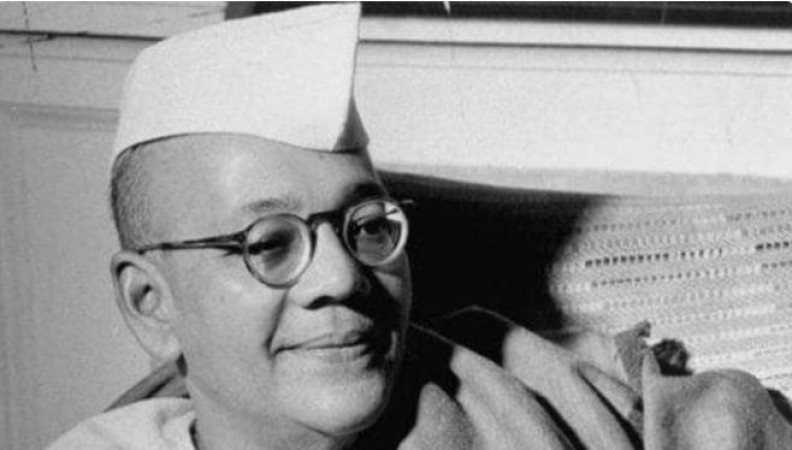
New Delhi: On September 6, 2023, the 134th birth anniversary of Sarat Chandra Bose will be commemorated, providing an opportunity to reflect on the multifaceted persona of this remarkable individual. Sarat Chandra Bose's life encompassed a diverse range of roles, including that of a humanist, patriot, freedom fighter, political thinker, parliamentarian, legal practitioner, journalist, philanthropist, and a person of exceptional qualities.
Born in Cuttack, Orissa, in 1889 as the second son of Janakinath and Prabhabati Bose, Sarat Chandra's journey into greatness began early. He pursued his higher education in Kolkata, earning an M.A. degree from Calcutta University in 1909 and qualifying as a lawyer in 1911. Notably, he was the first in his family to travel to England and qualify for the Bar (1912-1914), mentored by the legendary Nripendra Nath Sircar. Sarat Chandra achieved fame as a barrister, renowned for his advocacy skills and sharp cross-examinations, earning a substantial income. Importantly, his wealth was not merely for personal indulgence; he quietly directed significant amounts towards aiding the less fortunate, particularly students and fellow freedom fighters, including his younger brother, Subhas Chandra Bose, whom he deeply supported.
Sarat Chandra and Subhas Chandra Bose shared the ideology of Deshbandhu Chittaranjan Das, a prominent figure in the freedom movement. Sarat Chandra firmly believed in political rectitude, asserting, "Nothing which is morally wrong is politically right." His political journey began in the early 1920s when he became a member of the Bengal Legislative Council as a Swarajya Party representative. He established himself as an outstanding parliamentarian, also serving as an Alderman in the Calcutta Corporation from 1924 and a Councillor from 1930 to 1932. During the Civil Disobedience Movement in 1930, he relinquished his legal practice to dedicate himself entirely to Congress activities, secretly funding the revolutionary movement in Bengal, which he considered a valid alternative to non-violence.
For his involvement in this underground movement, Sarat Chandra Bose was imprisoned under Regulation III of 1818 for 3 ½ years in February 1932. The government viewed him as a prominent Congress leader, instrumental in supporting Subhas Chandra Bose and financing the Civil Disobedience Movement. Sarat's contributions extended to journalism as well, as he led fearless and honest publications like Forward (later renamed New Forward and Liberty) and the Bengali dailies Banglar Katha and Bangabani, setting high standards in journalism. He also established the Orient Press Agency and later started and edited The Nation.
The Bose brothers had connections with Irish revolutionaries, with Madame Maud Gonne McBride predicting Sarat's political journey after their meeting in Paris in 1914. Subhas Chandra and Sarat Chandra later interacted with Irish leaders like Eamon De Valera and Sean Mc Bride.
After Deshbandhu Chittaranjan Das's passing in 1925, Sarat Chandra dedicated himself to Swarajya Party work and played an essential role in various political arenas. He was elected President of the Bengal Provincial Congress Committee and successfully conducted the Calcutta Corporation elections in 1936. However, the late 1930s saw a significant turning point when the Bose brothers parted ways with Mahatma Gandhi and the Congress due to ideological differences.
In 1939, Sarat Chandra formed the Forward Bloc, and his collaboration with Subhas Chandra led to a powerful anti-British movement. Sarat Chandra's efforts continued even during his internment, where he remained secluded to prevent contact with anti-British forces. His son, Subrata Bose, noted that his arrest before taking office as the Home Minister was advantageous for the British, preventing any embarrassment due to his death during internment.
Upon his release in September 1945, Sarat Chandra made a comeback to national politics, surprisingly under the Congress banner. However, he soon found that his principles clashed with those of other Congress leaders. He opposed the Cabinet Mission Plan in 1946, leading to his resignation from the Interim Government, the Central Legislative Assembly, and ultimately, the Congress Working Committee in January 1947.
Sarat Chandra was a vocal critic of the partition of Bengal and Punjab, vehemently opposing it. His unwavering belief in a united, secular India led him to take a stand against communal violence. He actively participated in quelling communal riots in 1946 and organized relief work in Kolkata, advocating for Hindu-Muslim unity.
Sarat Chandra Bose envisioned India as a socialist republic with strong ties to its neighboring countries. He proposed the formation of a regional organization with India, Pakistan, Nepal, Burma, and Ceylon as members to safeguard independence, promote development, and defend neutrality. He also sought unity among Southeast Asian nations and supported freedom movements worldwide.
Sarat Chandra's passing on February 20, 1950, marked the end of an era of remarkable vision and activism. His broad perspectives, foresight, and internationalist outlook remain underappreciated, but his legacy lives on through the principles and ideals he espoused.
Twinkle Khanna and Akshay Kumar's Unbuttoning Stunt
"Test For Rahul Gandhi": Himanta Sarma On DMK Leader's "Eradicating Sanatana Dharma" Remark